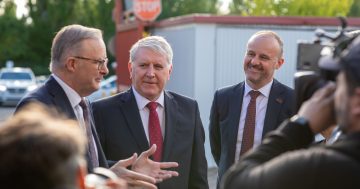
The proposed national skills passport will allow prospective employees to demonstrate their skills and qualifications. Photo: File.
A digital record for employees to keep their employment skills and qualifications has been proposed by the Federal Government.
It says the national skills passport will be developed in consultation with industry and governments. It will assist workers in promoting and demonstrating their qualifications, and help businesses find the right skills to meet their needs.
The Government says it will now prepare a business case to define the scope, outcomes and benefits of the passport as an element of its wider Employment White Paper released this week.
“For more and more workers in the future, their education won’t finish when they graduate school or complete their apprenticeship – they’ll need to continue to retrain, renew and reskill,” Treasurer Jim Chalmers said.
Mr Chalmers said the passport was about instilling a culture of lifelong learning, retraining and reskilling right through our working lives.
“Our goal is to make it easier for workers to have their qualifications recognised and easier for employers to find the well trained, highly qualified workers they need,” he said.
It is proposed the passport will contain information such as VET (Vocational Education and Training) or tertiary qualifications.
Part of developing the passport and defining its business case will involve a $9.1 million consultative process with businesses, unions, tertiary institutions, states and territories, and students to scope the needs and demands of all parties.
“It’s vital we build a more agile and adaptable labour force. Our economy is rapidly changing, and the demands on workers and employers are changing too,” Mr Chalmers said.
“We want to make it easier for more workers in more industries to adapt and adopt new technology and to grab the opportunities on offer in the defining decade ahead of us.”
Minister for Education Jason Clare said with more jobs requiring a post-school qualification, it was increasingly necessary for people to upskill and reskill throughout their careers.
“A national skills passport could make it easier for employees to demonstrate the skills they have, and for employers to have confidence that employees have the skills they need.”
Minister for Skills and Training Brendan O’Connor said the Government recognised the urgency of the skills crisis facing the nation and was building the skilled economy for the future.
“While our focus is on the skills shortages our economy is facing right now, we are also planning for the skills that will be needed in critical areas of emerging demand,” he said.
“Ensuring students’ skills are recognised so they can upskill, reskill and find work as the economy changes, is crucial.”
The Government has described the Employment White Paper – entitled Working Future – as “a vision for a dynamic and inclusive labour market in which everyone has the opportunity for secure, fairly paid work and people, businesses and communities can be beneficiaries of change and thrive”.
It says the White Paper is underpinned by five objectives, and it presents 31 reforms that will guide policymaking as well as the work of industry, unions, the education sector and civil society.
Managing director of Canberra-based recruitment firm Whizdom, John McCluskey told Region that, on principle, the passport was a good idea.
“Recruiters are often asked to independently validate an individual’s qualifications, and this can be a timely and complex activity with no consistency with universities in Australia making this data available,” he said.
“But with the lack of detail provided, we would have some concerns where this data is held, who can and how it is updated, who has access, who they might make the data available to, how it will be used, and if an individual gets to approve or see any request to access the data for privacy.
“Qualifications are also often bound by state boundaries, so will overseas qualifications be included, or specialist industry skills and training which are often just or more important than tertiary qualifications?”
Lesley Horsburgh, managing director of The Association of Professional Staffing Companies, said the proposed passport offered an interesting opportunity for information sharing on workers’ qualifications and credentials, and was “an inevitable step towards a fully digital economy”.
“As always, the details will be key,” she told Region.
“It is however, important that as Australia continues to be challenged in sourcing talent, we do not overlook minority groups who may not have access or appetite to use such a platform, which could inadvertently end up closing off opportunities for more diverse, yet highly employable groups.”













